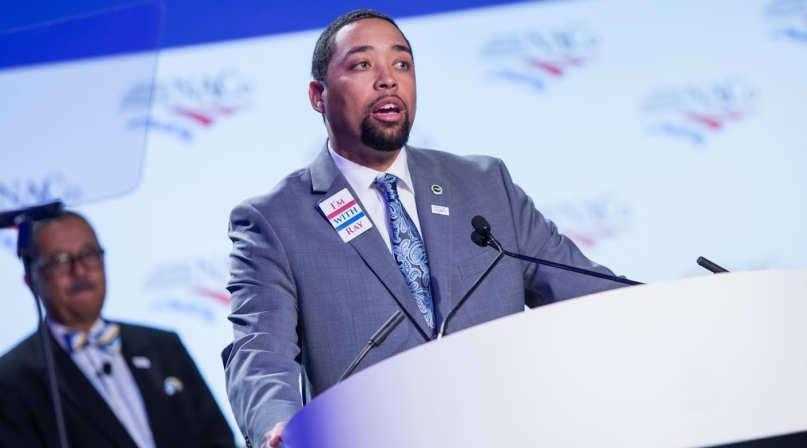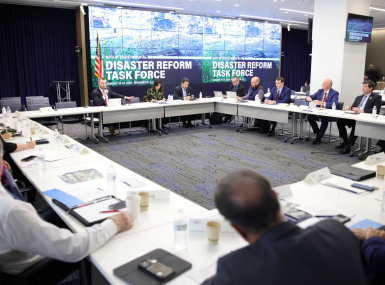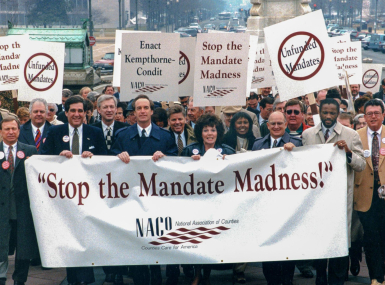2019 Second Vice President Candidate Ray Jeffers
Upcoming Events
Related News

Brannon ‘Ray’ Jeffers
County Commissioner
Person County, N.C.
Why are you interested in serving as a NACo officer?
I appreciate all the ways NACo has made me a better commissioner and I have seen firsthand how counties become stronger when we unite, and I am eager to spread that message to every commissioner across the country to get involved in NACo. I am seeking the position of second vice president as a way to give back to the organization, unite our counties to find common solutions, and energize and grow our membership.
When I started out as a new commissioner over 11 years ago, NACo served as an incredible resource for me. Through my involvement with NACo, I built camaraderie with fellow county commissioners throughout the country and learned from their experiences. I also gained valuable insight from educational opportunities NACo provided, which allowed me to bring effective solutions back to my home county.
I ran last year for second vice president and it was one of the greatest experiences of my life. I traveled all over the country to our NACo conferences. I met so many great people and heard about all the great things they are doing back home in their counties that we can share and duplicate across the nation. I also heard their concerns and talked about how NACo could help them. Everyone I met over the last year inspired me to get back out there this year and I owe a special thanks to all my supporters, who encouraged me to run again.
In North Carolina we have taken the mantra that we are 100 counties but we are also one state. I took this approach as president of the North Carolina Association of County Commissioners and it advanced our goals at the state legislature. As second vice president of NACo, I intend to unite our members around a common purpose and work collaboratively toward solutions. Yes, we are 3,069 counties, parishes and boroughs, but we are one nation. And the more we can work together and understand each other’s issues then we can move forward together as a nation.
What do you consider to have been your most important contribution to the National Association of Counties to date? What do you consider to have been your most important contribution to your state association of counties?
When I served as chair of the Rural Action Caucus, I had the opportunity to meet many officials from rural America, like myself, and hear their concerns. We share more similarities than differences and as the RAC chair I worked closely with the Large Urban County Caucus. Together we were able to examine many issues of shared concern for both rural and urban commissioners. Under the leadership of Immediate Past President Roy Charles Brooks, who was serving as the chair of the Large Urban County Caucus at the time, RAC and LUCC came together to identify common issues facing both urban and rural counties and collaborate on potential solutions. I also worked with fellow NACo members from rural counties and allied organizations to reauthorize the Farm Bill. As part of that effort, I traveled to Washington, D.C. to collaborate with other stakeholders to promote passage of the bill.
At the state level, I served as president of the North Carolina Association of County Commissioners (NCACC). As President, I led an economic development initiative to achieve sustainable growth for all counties — large and small, rural and urban. The plan encouraged rural counties to join forces with urban counterparts to find opportunities to collaborate and promote growth across county lines. I firmly believe that by working together, rural and urban counties can innovate by leveraging their unique strengths.
As part of my presidential initiative, I established a task force to examine and provide recommendations to enhance the county role in economic development. The task force engaged in discussions with experts and county officials through a statewide listening tour and economic development symposium. Through this work, I learned that a lot of opportunities are possible if we combine the strengths of the rural and urban areas. Together, we can develop regional economic hubs in all stages of production, including design, manufacturing and distribution of products and services.
As president of the North Carolina Association of County Commissioners I united commissioners in a deep purple state with vibrant rural and urban communities and varied political views. Together, we were able to focus on a common vision of economic growth for all. I’m eager to put my skills and experience to work for NACo to find common ground and discover new opportunities for collaboration among all our nation’s counties.
What do you consider to be the two or three most important challenges facing NACo in the near future on which the Officers/Executive Committee/Board of Directors should focus? Why?
If elected second vice president, I will focus on tying together rural and urban areas through collaborative and innovative initiatives. Two areas of specific focus I will prioritize are increasing broadband access and strengthening our nation’s agriculture industry.
Increasingly, there is broad acknowledgement at the federal, state and local levels that broadband access is a community necessity. In Person County, North Carolina, we as county leaders worked with the private sector and other stakeholders to develop an innovative project to install 52 miles of fiber as part of a county-owned network that will connect most public facilities — such as county and city government buildings, public schools, volunteer fire departments, and more — to broadband. I want to work with other counties throughout the country to share and develop an inventory of best broadband practices so we can help others crack the nut on this complex issue because the future is at stake for those communities without access.
Being from rural North Carolina and a local farmer, I know the importance of agriculture to the local economy, the state and the nation. I know that when we take care of farmers it boosts the local economy and provides a critical community benefit — access to healthy, fresh food. I want to help agriculture-producing rural counties join forces with urban counties to expand access to affordable and high-quality, fresh food.
I am part of a farming cooperative where we send our fresh produce and pasteurized meats to areas in Baltimore where food deserts exist, where residents, especially low-income families have difficulty buying affordable or good-quality, fresh food. This is just one way that rural and urban counties can work together to address needs in our communities and improve health outcomes in all our counties. Healthy eating leads to healthy living, and smart policies like this can also help reduce strains on county health services.
As NACo second vice president, I will fight for federal policies that strengthen agriculture and sustain the American family farming tradition. My personal experiences as a member of a multi-generational farming family and rural commissioner make me an effective leader on these issues. With so many things affecting the agriculture industry today, it’s important that our nation’s farming communities have an advocate who understands firsthand our way of life and tradition. This is what separates me from other candidates. I grew up working on our family farm, which was purchased by my great-grandfather in 1919. From a young age, I embraced the farming lifestyle, serving as president of the local chapter of Future Farmers of America and focusing on agriculture education as part of my studies at North Carolina Agriculture & Technical University. I will prioritize efforts to raise awareness both internally and externally about the economic impact of the agriculture sector and the importance of ensuring our nation’s food security.
What measures would you recommend to increase and retain NACo membership and to encourage broad participation in NACo by elected officials and employees of NACo member counties? What specific role would you be willing to assume to help build and sustain membership in NACo?
NACo’s strength and influence are inextricably linked to the level of engagement of our members. The more we can encourage counties to participate actively in NACo, the more power we will have to advocate for our federal priorities to help counties thrive. I propose launching a strategic communications initiative to activate our members to share their individual stories about why Congress and federal agencies need to act on NACo’s legislative priorities. A compelling story has the power to influence policy makers and well-planned, well-placed stories can change minds.
Moreover, NACo’s advocacy success demonstrates to our members NACo’s value and helps with retention and recruitment. This initiative would also mobilize our members to share their individual stories about how the organization helped them grow and deliver better services for their counties back home. These compelling stories will raise awareness about the full range of benefits NACo has to offer and help grow our membership.
Attachments
Related News

National Association of Counties Announces Additions to Senior Leadership
The National Association of Counties (NACo) announced today that Abby Davidson has been promoted into the role of Chief Research Officer. Davidson joins Chief Government Affairs Officer Eryn Hurley, announced earlier this month, and 2025 additions Lori Dicker, Chief Public Affairs Officer, and Luis Guardia, Chief Financial Officer, to round out a series of additions to the association’s senior leadership team.

NACo history: Counties emerge from pandemic
Counties across the country emerged from the pandemic with a historic legislative achievement and a roadmap to making more out of the intergovernmental relationship.
